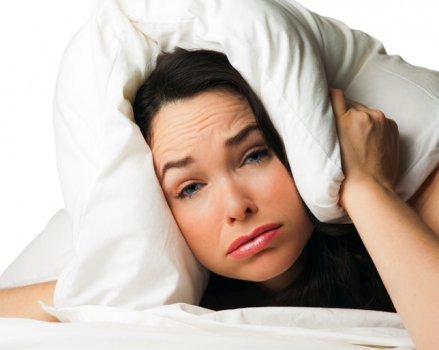Feeling Sleepy?
Debunk Fatigue, Insomnia, & Depression
It’s time to wake- up!

Sleep disorders are a common ailment, so if you've been tossing and turning a lot at night it may comfort you, even if slightly, to know that you're not alone in your night-time despair. According to the Centers for Disease Control and Prevention, about 70 million adults suffer from chronic sleep problems in the United States and 40% of all American women have had a sleeping disorder at one point in their lives.
Disrupted sleep patterns can seriously affect our health and mood, nonetheless, they exert an extra mental and emotional toll. No need to get in a tizzy, there are ways to address sleep disorders and take back your life! And the first step is to identify exactly what your body is going through. Not getting enough sleep, as well as interrupted sleep is associated with metabolic health issues, including Type 2 diabetes, says a new study in The Lancet Diabetes & Endocrinology.
Causes of Sleep Disorders
Hormonal Changes
Hormones, surely rule our lives. They cause many of the major changes in our anatomy and mark our physical milestones, from puberty to menopause. When a hormonal imbalance occurs, there are disruptions in our body that make us feel "not like ourselves".
Adrenal fatigue
Our adrenal or endocrine glands release hormones that deal with stress and they can get "fatigued" when the body is in a constant fight-or-flight state. If you suffer from adrenal fatigue, you may feel unusually tired but cannot go to sleep, find it hard to wake up in the morning, and you may be more susceptible to depression or illness.
Menopause
Insomnia: the inability to fall asleep or to stay asleep. It’s a common ailment of women who are going through perimenopause, menopause, and even post-menopause. During menopause, your ovaries produce less estrogen and progesterone- two sleeping-aid hormones. The hot flashes and mood swings don't help either, but some sleep hygiene habits can make the process less distressing.
Chronic Diseases
Ailments like chronic pain, heartburn, digestive illnesses, sleep apnea, and diabetes can cause insomnia for two main reasons:
- the pain or ailment itself can keep you tossing and turning trying to find the least uncomfortable position in which to sleep.
- many drugs used to treat these diseases may cause insomnia or excessive sleep.
Environmental Causes
Your sleeping environment is a physical cause of your sleeping disorder, even if it's not in your body. A snoring partner, a room poorly darkened or a busy road nearby is often the culprit of those sleepless nights. Invest in a good pair of thick curtains, an eye mask, a white noise machine, and some soft earplugs before reaching for over-the-counter sleeping pills.
Depression
Clinical depression is an ailment that affects neurotransmitters like dopamine and serotonin, the brain chemicals responsible for motivation, reward, and arousal. When these chemicals are lacking, there's a general feeling of despair and stress, which disrupts sleeping patterns. Essentially, we either sleep too much or too little and at odd times.
Post Traumatic Stress Disorder
PTSD causes a very specific type of insomnia. Traumatic experiences like sexual abuse, natural disasters, and war can cause flashbacks and fear of falling asleep, and which need to be treated by a specialist. Anxiety and depression are often present in PTSD.
Sleeping Pills: Friend or Foe?
 Artificial sleeping aids are, in the long run, your enemy. Sleeping pills can make chronic depression more acute and some of them will make you drowsy for hours after waking up. Possibilities include heartburn, palpitations, and provoke involuntary movements. Women process these drugs more slowly than men, and taking a pill at night might mean that you will be impaired for driving, even the following day.
Artificial sleeping aids are, in the long run, your enemy. Sleeping pills can make chronic depression more acute and some of them will make you drowsy for hours after waking up. Possibilities include heartburn, palpitations, and provoke involuntary movements. Women process these drugs more slowly than men, and taking a pill at night might mean that you will be impaired for driving, even the following day.
Now that we have identified sleep problems, let’s talk about how to solve the issues!
Natural Sleeping Aids
If you can fall asleep yet struggle at staying asleep, you may be lacking in melatonin. The neat thing about melatonin is your brain produces it and regulates circadian rhythms, and is best used when you’re suffering from jet lag and delayed sleep disorder. Natural sleeping aids are readily available and can make a difference in your life –without affecting your body. For mild insomnia, try valerian and chamomile teas. Supplements with 5-HTP & L-Theanine increase dopamine levels, helping you lower stress and feel better in general.
Organic Foods
To ease the arrival of sleep, you can also add specific foods to your dinner or evening snack. Cottage cheese: it contains tryptophan, an amino acid that increases serotonin and neurotransmitters that helps regulate sleep. Foods rich in calcium are especially beneficial for women who are going through menopause, as they lower the incidence of uncomfortable hot flashes and moodiness.
• Oatmeal: carbohydrates in this yummy fiber food take a while to digest and releases serotonin, which during the day also helps reduce stress.
• Peanut butter: nuts are an excellent source of niacin, which also helps release serotonin.
• Warm milk: this is an oldie but a goodie. The warmth of milk is soothing and contains the amino acid, tryptophan. Warm milk with oatmeal? Excellent choice!
• Grapes: the only fruit that contains melatonin, so a handful of grapes before going to bed can help regulate your sleep cycle.
Cognitive Behavioral Therapy
CBT is an effective practice to learn how to sleep better. It’s about changing habits that can make a whole lot of difference, for example:
• Go to bed every day at the same hour and try to do the same when you wake up.
• If you’re in bed tossing and turning, stand up and walk out of the bedroom. Don’t make your bed an enemy! Go to your living room, don’t turn on the lights, and just sit–no computer or TV. Wait until you feel sleepy, and then go to bed.
• Turn off all electronics one hour before bedtime.
• Darken your bedroom. Even when you close your eyes, you’re still sensitive to light, so try to block any source.
Meditation & Relaxation
Meditation has beneficial consequences for your brain waves. Beta brain waves are the ones we use at work when doing some intense thinking and when we’re stressed. Alpha brain waves, which are displayed during meditation, appear when we’re relaxed. Meditation before bedtime helps you prepare to sleep.
Regular Exercise
Consistent exercise helps your overall health. It contributes to stress reduction, which will lead to a better quality of sleep. Doing cardio releases endorphins, neurotransmitters (brain chemicals) that relax, diminish anxiety, and help deal with depression. So hop on that treadmill or make it part of your routine to go for a walk.

